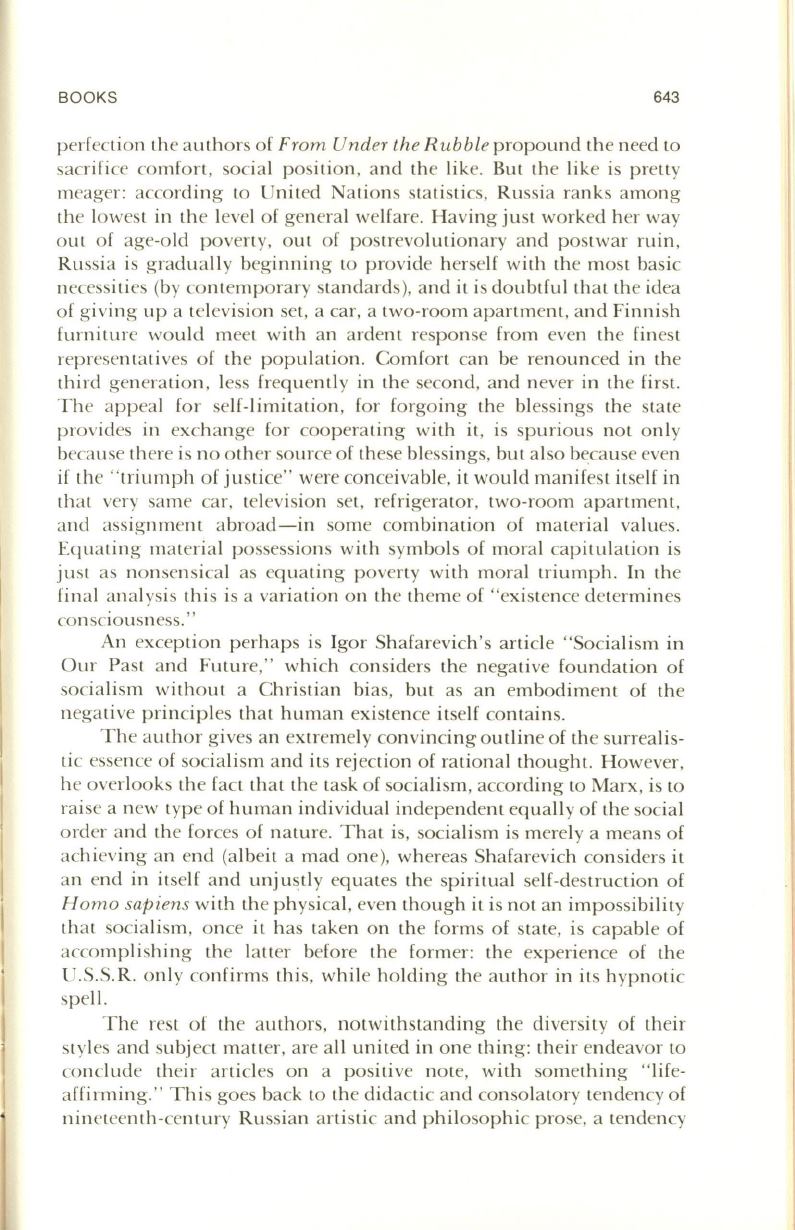
BOOKS
643
perfecti on th e autho rs o f
From Under the R u bble
propound th e need
to
sacrifi ce comfort, social pos ition , and the like. But the like is pretty
meager: according to United Na tions sta ti sti cs, Russia ran ks among
the lowes t in the level o f general we lfare. Hav ing just worked her way
ou t of age-o ld poverty, out of pos trevolu tionary and postwar ruin ,
Ru ss ia is g radu a ll y beginning to provide herself with the mos t basic
necessiti es (by contemporary standards), and it is doubtful tha t the idea
o f g ivin g up a televi sion set, a car, a two- room apartment, and Finnish
furnitu re would meet with an ardent response from even the fin est
representa ti ves o f the popul ation. Comfort can be renoun ced in the
thi rd genera tion , less frequentl y in the second, and never in the fi rst.
T he appea l for self-limita ti on, fo r forgo ing the bl ess ings the sta te
p rov ides in exchange for coopera ting with it, is spu rious no t onl y
because th ere is n o o ther sou rce of these blessings, but also because even
if the " triumph o f justice" were conceiva bl e, it would manifes t itse lf in
tha t very same ca r, television set, refri gera tor, two-room apartment,
and ass ignment a broad-in some combina ti on of ma teri al va lues.
Equat ing ma terial possess ions with symbo ls o f mo ral cap itu la tion is
just as nonsen sica l as equa ting poverty with moral triumph . In the
fina l ana lys is thi s is a va ri a ti on on the theme of "exi stence determines
con sciousness. "
An excep tion perhaps is Igor Shafa revich 's articl e "Sociali sm in
Our Past and Futu re," whi ch considers the nega tive founda ti on of
socialism without a Chri stian bias, but as an embodiment of the
nega ti ve p rinciples tha t human exi stence itself contains.
T h e author gives an extremely convincing outline of the surreali s–
tic essence of socialism and its rejecti on of ra tiona l thought. However,
he overl ooks the fact tha t the task of socialism, according
to
Marx, is to
ra ise a new type o f human indi vidual independent equall y of the social
order and the fo rces of na ture. T ha t is, socia li sm is merely a means of
achieving an end (a lbeit a mad one), whereas Shafa revich con siders it
an end in itself and unjustl y equa tes the spiritual self-des truction of
H omo
sapiens
with the p hys ical, even though it is not an impossibility
tha t socia li sm, once it has taken on the forms of sta te, is capable of
accompli shing the la tter before the former: the experience o f the
U.S.S. R. o nl y confirms th is, whil e ho lding the author in its hypno tic
spell.
T he res t o f the autho rs, no twithstanding the diversity o f their
styles and subj ect ma tter, a re all united in one thing: their endeavor to
concl ude their arti cles on a pos iti ve no te, with something " Jife–
affi rmin g." T hi s goes back to the didacti c and consola tory tendency o f
nin eteenth -century Ru ssian arti sti c and phil osophic prose, a tendency


